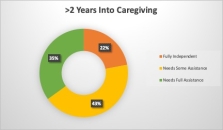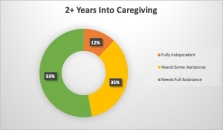Managing Your Parents' Finances
Here are some helpful tips to ensure you are covering all the bases when your aging parents can no longer manage their money.
Explore:
Becoming a caregiver for aging parents can bring unexpected responsibilities, such as managing their finances. These helpful tips can help with senior financial planning, and help you navigate the role of financial caregiver when Mom or Dad need help or can no longer manage their money alone.
Financial Caregiving
About 92% of caregivers are handling finances on behalf of their loved ones. They pay bills from their care recipient’s accounts, monitor bank accounts, handle insurance claims, file taxes and manage invested assets, according to a Merrill Lynch study, conducted in partnership with Age Wave.
The study also found that caregivers’ involvement with aging parents’ finances is likely to grow over time. Less than two years into caregiving, 35% of care recipients need full assistance managing their finances. Two or more years into caregiving, that number goes up to 53%.
Percent of Care Recipients Needing Help Managing Finances Over Time
(Merrill Lynch/Age Wave 2018)


So if you’re caring for elderly parents, it’s important to be prepared to take on at least some financial caregiver responsibilities.
Legal Protections
To be your loved one’s financial coordinator, they need to name you as their fiduciary, which is a legal guardian of their assets. This allows you to make financial decisions on their behalf if they should become unable to manage their money. There are four ways to become a fiduciary:
- Power of Attorney (POA)/Durable Power of Attorney. In this legal document, one person grants another the authority to make financial decisions on their behalf. Your loved one needs to be of sound mind to grant POA, and they must be of sound mind to revoke it. A durable POA remains valid if your loved one becomes incapacitated. If the POA doesn’t explicitly say the power is durable, it ends if they become incapacitated. Without a POA or trust, you may have to go to court to file for guardianship. Each state has their own requirements for POAs, so be sure to investigate thoroughly.
- Trustee. Your loved one can transfer assets to a revocable living trust and names you the trustee. If they lose their ability to make sound financial decisions, the trustee becomes responsible to keep the trust safe.
- Government Fiduciaries. They are appointed by a government agency, such as the Social Security Administration or the Department of Veterans Affairs, to manage the monthly benefit checks issued by that agency.
- Court-appointed Guardians. If a court finds your loved one can’t manage property or money on their own, a hearing is held to appoint a guardian of their assets. Guardians must act in the best interest of the protected person, and must report to the court regularly to explain how the money is being spent.
10 Financial Questions to Ask Your Loved One
It’s important to talk to your loved one about how they manage their finances now so you can be prepared to help them in the future. Here’s how to get started.
- Do you have a durable power of attorney to manage your finances?
- Where do you keep financial records – and how are they accessed?
- What are your financial institutions (bank, investment firm, mortgage company, etc.), and where are the account numbers?
- What are your monthly expenses?
- How do you currently pay your bills (checks, online banking, automatic deductions, etc.)?
- What is your annual income, and where does it come from? (Pension, dividends, alimony, disability benefits, etc.)
- Do you receive Medicare, Medicaid or Social Security?
- What other medical health care insurance do you have?
- Do you have long-term care insurance?
- Do you have a financial planner, accountant, insurance agent or attorney, and what is their contact information?
Financial Document Checklist
As you discuss these questions with your loved one, gather the appropriate documents into one, secure location. Having them will help you understand their financial situation, and can alert you to unusual spending patterns that might indicate diminished mental capacity or fraud.
- Bank account records
- Credit card statements
- Monthly bill statements
- Loans or other debts
- Social Security benefit statement letter
- Social Security statements
- Pension, annuity and 401k documents
- Tax returns from the last 3-7 years
- Insurance policies
- Property deeds
- Will, estate plan, etc.
- Vehicle titles
- Investment documents
- Dues-paying memberships
- Birth certificates
- Marriage licenses
- Usernames and passwords for online customer portals
- Combinations and/or keys for safety deposit boxes
Planning for the Future
As you gather financial information and start getting a clear picture of your loved one’s current resources, it’s important to also think about a plan for their future.
- Is their house the safest living option? Can they afford to modify or repair their house?
- Is their home the most economical option, or are they investing more than they should in its upkeep?
- If they should need a higher level of care, how will it be paid for? Do you know how much assisted living costs in your area, for example?
Finding yourself in the role of financial caregiver can feel overwhelming. Take it one step at a time, make use of the many resources available to you, and know that managing their finances is another way to take care of those you love.
Where You Live Matters is powered by the American Seniors Housing Association (ASHA), a respected voice in the senior housing industry. ASHA primarily focuses on legislative and regulatory advocacy, research, and educational opportunities and networking for senior living executives, so they can better understand the needs of older adults across the country.
Sources:
The Journey of Caregiving, Merrill Lynch/Age Wave, 2018
AARP.org
Consumer Financial Protection Bureau
AgingCare.com
TheSimpleDollar.com
Nolo.com
USLegal.com
